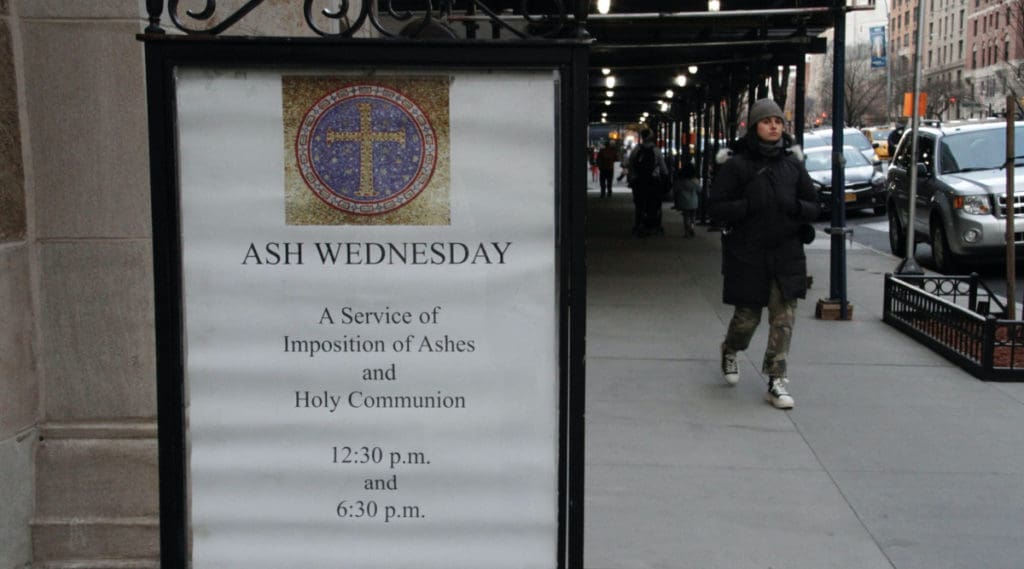Reflecting on last week’s Ash Wednesday Masses it is possible to observe an unusual and puzzling sight. On this day, almost every priest looks out into a congregation that is barely recognizable. To be sure there are many familiar faces of those who regularly attend. But almost half (!) or more of the congregation is populated by faces unknown. Have tour busses unloaded their riders from distant lands? Is this the holiday season where many are here visiting family? No, this is Ash Wednesday, a most peculiar day. Even days before, the phones start ringing and rather urgent voices on the other end ask, “When will ashes be given?” One might almost think that ashes were necessary for salvation. Sadly, to none of the Sacraments is such urgency attached, even among the more faithful. Baptisms, confessions, marriages and Mass itself are often delayed, or even wholly omitted. But come Ash Wednesday there is an urgent and laser-like focus exhibited by large numbers of otherwise disinterested Catholics, it seems like many are majoring in the minors.
We may lament this, but what can we learn from this? Somehow, even if unwittingly, the Church has powerfully connected with a large segment of otherwise non-practicing Catholics as well as the unchurched. Ashes are awesome! Really? It’s pretty humbling isn’t it? The usual Catholic attempts to seem positive and “relevant” such as trendy music and positive “welcoming” themes are often found wanting. But then, these ashes, which break all the “rules” and theories of modern evangelization powerfully connect with the very folks we are trying to reach. Maybe we have things to learn!
Consider that the message of Ash Wednesday and the imposing of ashes is not one of our more joyous and positive messages. The fundamental message of this sacramental is, “You are going to die.” Sure we use a little poetry to say it: “Remember you are dust and unto dust you shall return.” But, its fundamental message is still the same: “You are going to die.” Even if one uses the alternate formula, “Repent and believe the Gospel”, repent is not one of our more cheerful or “welcoming” messages. People are not piling into Church to hear John 3:16 (God so loved the world…) and take some valuable or lasting token like a holy card or religious medal. They are lining up to have dirty ashes smeared on their forehead and to hear that they are going to die and need to repent before it’s too late. The Prophet Joel and St. Paul issue urgent warnings that we should weep and fast on account of our sins, that we must repent and be reconciled to God.
This is hardly what most modern evangelizers tout as the way to reach souls. But souls line up for it every year. Granted, many are not convicted enough to come again until next year, but the point is that the one time they DO come is on a day that breaks almost every precept of the “welcoming community” message at the heart of modern Church out-reach.
Why is this and what can we learn? In answering this I do not have vast polling data on which to rely. I have only anecdotal data from years of talking to Ash Wednesday Catholics and from hearing what others have discovered in their conversations. So, take what you like from my thoughts and leave the rest. Here then are a few thoughts.
Belonging seems to be deeper than membership or practice.
Many have left the formal practice of the faith and active membership. Some have angry differences with the Church, other have simply drifted or are indifferent. But, when it comes time to answer a survey question of their religious identity, they still check “Catholic.” Ash Wednesday somehow taps into this belonging and identity. It is a day, through the wearing of ashes or the participation in a well known rite that many of these Catholics say, “I still belong….These are my roots…I may not be a “good” Catholic, but Catholic I am.” In some sense, one might leave the Church but the Church never really leaves them; something is still there nudging them not to forget. To a lesser degree Palm Sunday serves a similar purpose and that little piece of palm leaf displayed in the home, usually on or near the crucifix gives voice to Mother Church’s tug on our heart. Though it, some Catholics say, “Through I am distant, I still belong.” In places like Mexico and the U.S., some Hispanics have gone to the Evangelical denominations, but the image of Our Lady of Guadalupe is still prominent in their homes. It is as if to say, “You can take the Man out of the Church, but you can’t take the Church out of the Man.”
Yes, belonging has deep roots, and somehow, people ritually express a kind of “forget me not” to the Church. Clearly, we want to offer them more, but at least there is still some connection, some homing beacon that reminds us and them that they “still belong.”
A serious and sober message carries weight.
Though the message associated with the imposition of ashes is not a cheerful one, it does carry weight; it is something to take seriously and something which commands respect. Hence the Church is attractive when she preaches and teaches in a way that is substantial and respectable. Most people know that not everything is right in their lives and the message of Ash Wednesday resonates with this instinct. Most people, in seeking a doctor, want one who takes disease seriously and is willing to have an honest conversation about what must be done. Even if they are not ready or willing to follow all of his or her advice, they ultimately want the truth and will not respect a doctor who is not serious or engages in mere flattery. To a significant degree, we have lost a sense of this in the Church.
As noted above, there has been a tendency in the past fifty years to “lighten up.” Great emphasis is put on “positive themes” such as God’s mercy and goodness, but little emphasis on repentance, which is the key that unlocks that mercy. There is almost a pathological avoidance of controversial moral teachings or more “negative” themes such as death, judgment, heaven and hell. No one should ever be upset and the fear of consequences should not be elicited. Parishes should be welcoming and non-judgmental, homilies encouraging and uplifting, sacrifices and reparation for sin and the demands of discipleship are soft-pedaled. And of course, “God is Love,” but that “love” is more often presented as a soft kindness, rather a strong love that seeks to set things right and bring us to the healing of holiness. Affirmation too often eclipses transformation. As for the liturgy, it is often not often celebrated in a way that says something profound and healing is taking place here. And while some think this is the necessary approach today to win converts, our churches have been steadily emptying through this period of “Catholic Lite.”
Further, such a pastoral strategy does not elicit the respect and reverence necessary if the Church is going to preach the Gospel with authority. And though many modern liturgists fear that negative themes will repulse modern man, Ash Wednesday calls such fears into question. So too Palm Sunday whose theme is the Passion. The Palm Sunday Gospel is long and intense; the suffering due to our sins is made quite clear. Yet attendance is also very good, in some places, even better than Easter or Christmas.
So here are some things to learn in terms of Evangelization. These observations are not intended in an absolute sense. Balance is needed where the bad news of sin, death and our need to repent are blended with the good news of mercy, healing and salvation. There is an old saying, “If you don’t know the bad news, the good news is no news.” Collectively we have been too averse to presenting the bad news. But as Ash Wednesday and Palm Sunday show, many of the unchurched are willing to hear it and fundamentally know it is true. The bad news also highlights how wonderful the good news is.
It is also clear that, whatever respect Ash Wednesday and Palm Sunday command, it is not enough. Only rarely do attendees at an Ash Wednesday Mass experience the conversion that helps the Church seal the deal. Looking to the future we do well to ponder how we might make use of evangelical moments such as Ash Wednesday, Palm Sunday, as well as funerals, weddings and baptisms. Many unchurched are encountered in such moments and simply preaching light-heartedly may need to be balanced with sober calls for repentance and a decision to walk with the Lord in the Church and in the Sacred Liturgy.
Warnings have their place and as Ash Wednesday shows, such messages are not as unappealing as many in the Church think. If we want Ash Wednesday Catholics to become All Sunday Catholics, maybe we can learn to build on what brings them in the first place and be less anxious to echo the opening words of Jesus’ public ministry, “Repent and Believe the Gospel!”
Image by Depositphotos.
This post was originally published in Community in Mission and is reprinted here with permission.




